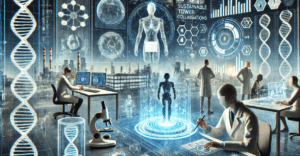Bill Gates Reveals 3 Jobs AI Can’t Replace – Shocking Prediction for the Future
Bill Gates recently shared his views on AI’s impact on the job market, predicting that while automation will take over many roles, some professions will remain safe. Unlike other tech leaders who believe AI will replace coders, Gates argues that humans will still play a vital role in programming and other fields. He identified three key professions that AI won’t fully replace: biologists, energy experts, and certain technical roles. While AI can assist in diagnosing diseases and analyzing DNA, it lacks the creativity needed for scientific breakthroughs.
Similarly, the complexity of the energy sector makes it difficult to automate entirely, ensuring the need for human expertise. Other technical fields will continue to require problem-solving skills, critical thinking, and human judgment. With AI advancing rapidly, its influence on the workforce is undeniable, but Gates remains optimistic that some careers will always need human intelligence. His insights suggest that while AI will reshape industries, human expertise will still be essential in many areas.
CONTENT:

Bill Gates Reveals 3 Jobs AI Can’t Replace – Shocking Prediction for the Future
Since ChatGPT’s debut in 2022, artificial intelligence has reshaped how we work, think, and solve problems. While AI tools currently assist professionals rather than replace them, many fear machines will eventually take over jobs in industries like tech and healthcare. Microsoft co-founder Bill Gates recently addressed this concern, offering a reassuring perspective: some careers will always depend on human skills, no matter how advanced AI becomes.
Gates’s view contrasts with predictions from other tech leaders, such as NVIDIA’s Jensen Huang and OpenAI’s Sam Altman, who suggest even software developers could be phased out by AI. But Gates disagrees. He believes humans will remain central to coding and other critical roles, emphasizing that AI lacks the intuition, empathy, and creativity required for groundbreaking work. As businesses race to integrate AI, he highlights three fields where human expertise will remain irreplaceable:
1. Biologists: The Power of Human Curiosity
AI has already proven valuable in biology—analyzing DNA, predicting protein structures, and identifying disease patterns. But Gates argues that machines cannot replicate the creative spark behind scientific breakthroughs. For instance, while AI can flag a genetic mutation linked to cancer, it takes human researchers to ask why that mutation matters and develop therapies to target it.
“Discoveries require curiosity,” Gates explains. “AI can process data, but it doesn’t ask, ‘What if we approach this differently?’” A prime example is mRNA vaccine development, which revolutionized medicine during the pandemic. This breakthrough resulted from decades of human-led research, risk-taking, and adaptation to unforeseen challenges—skills AI cannot replicate. Biologists will continue to lead in forming hypotheses, testing ideas, and transforming data into real-world impact.
2. Energy Experts: Navigating Complexity Beyond Algorithms
The energy sector is more than just physics and engineering—it’s a complex system influenced by politics, economics, environmental concerns, and public perception. Transitioning to renewable energy, for instance, isn’t just about improving solar panel efficiency; it requires balancing costs, shaping policies, upgrading infrastructure, and persuading communities to embrace change.
AI can model energy grids and predict usage trends, but it takes human expertise to make difficult judgment calls. How do you convince a coal-dependent town to embrace wind energy? How do you allocate resources during a climate crisis? These decisions require ethics, empathy, and strategic thinking—qualities AI does not possess. Gates notes that energy challenges are too interconnected and nuanced for AI to solve alone.
3. Technical Fields Where Judgment Matters
While AI excels at automating repetitive tasks, Gates stresses that many technical roles demand adaptability and critical thinking. Take software development: AI can generate code, but humans must debug errors, ensure usability, and make ethical design choices (like prioritizing privacy in apps). Similarly, engineers designing bridges or airplanes rely on experience to assess risks no algorithm can fully predict.
Gates also highlights fields like education, law, and healthcare. AI may help teachers grade quizzes, but only humans can inspire students, address emotional needs, and adapt lessons to different learning styles. Lawyers use AI to scan documents, but crafting persuasive arguments and negotiating settlements requires human insight. Even in medicine, where AI assists in diagnosis, doctors combine data with patient histories and gut instincts to make the best treatment decisions.
Why Humans Aren’t Going Anywhere
Gates acknowledges that AI will reshape many jobs—especially in administration, manufacturing, and customer service. However, he remains optimistic. “AI is a tool, not a replacement,” he says. Its real potential lies in enhancing human work by automating tedious tasks, allowing professionals to focus on higher-value contributions like innovation, strategy, and interpersonal connections.
For example, biologists could use AI to simulate thousands of drug interactions in minutes, then focus on testing the most promising ones. Energy analysts might rely on AI forecasts to guide investments in sustainable projects. The key, Gates argues, is adapting education systems to teach creativity, leadership, and emotional intelligence—areas where humans will always outperform machines.
The Bottom Line
While AI’s rapid growth is undeniable, Gates’s message is clear: fear isn’t the answer. Instead of worrying about job losses, professionals should see AI as a collaborator. By handling routine tasks, AI allows humans to focus on what they do best—imagining, connecting, and solving complex problems. The future of work isn’t about humans versus AI; it’s about humans with AI, achieving more together than either could alone.
You must be logged in to post a comment.